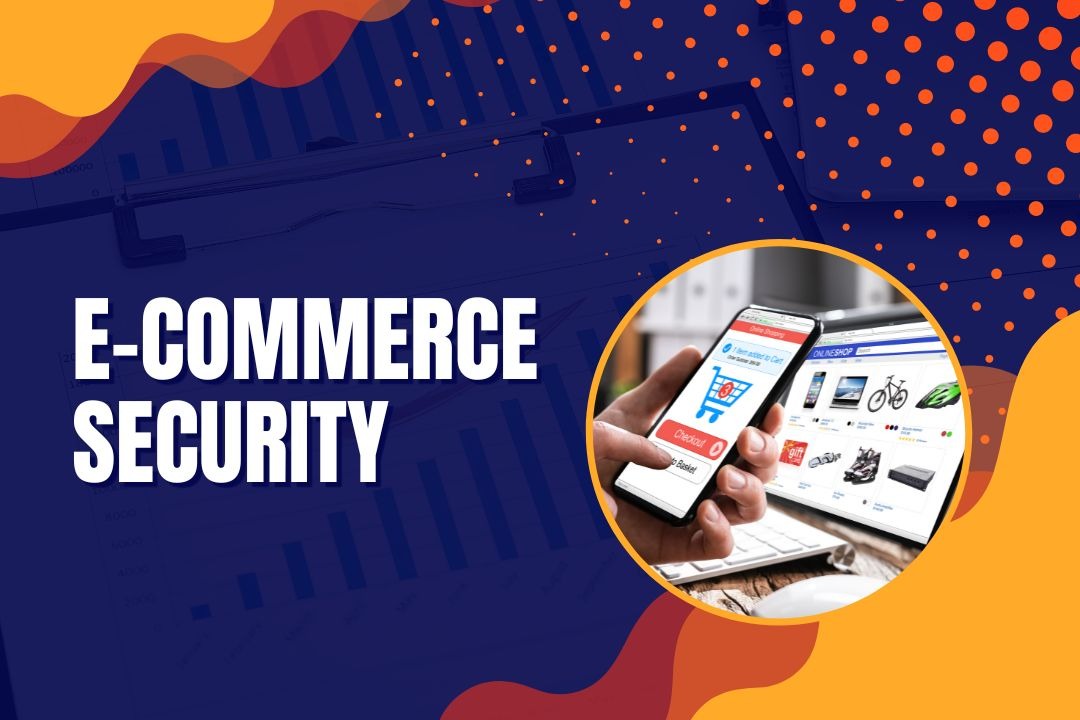Why e-commerce security is crucial for your online business? What are the best practices to protect your online store? You have come to the right place to find out all these answers.
Ecommerce security is the guideline to protect your online store’s transactions and customer information. The online store or website is always susceptible to cyber-attacks and breaches.
Cyber-attacks are phishing, SQL injection, malware, brute force attack, spam, e-skimming etc. Security measures in your business are essential to prevent all these cyber threats. The security measures contain privacy, authentication, integrity and non-repudiation.
However, the best security measures for protecting your online stores are using firewalls, adding multilayer security, installing antivirus, using SSL certificates and more.
In this guide, we will explain what ecommerce security is, why it is important, its common issues, its advantages and many more. Ready to learn all these in detail? Then let’s begin:

What Is E-commerce Security?
E-commerce security is the protocols and guidelines that ensure your business customer’s safe online transactions. This security safeguards people who buy and sell goods and services online. You must put the ecommerce security basics in place to gain your customer’s trust.
The ecommerce safety basis includes privacy, authentication, integrity and non-repudiation. Now let’s take a closer look at this:
Privacy
Preventing your customer’s sensitive data sharing with unauthorized third parties is privacy. A customer’s information should be accessible only by the customer’s chosen seller.
No one else should have the user’s account details and personal information. A confidentiality breach occurs if the online seller allows others to access the user’s confidential information.
An online business should use firewalls, antivirus, data encryption, etc., to protect the user’s personal information. All these will surely go in a long way to protect your client’s bank details and credit card information.
Authentication
In eCommerce security, the authentication principle is that the buyer and seller should be real. To prove the business’s authenticity, it should deal with genuine services or products and deliver the promised product.
The client should also make the seller feel secure by giving their identity proof for online transactions. From both the buyer’s and sellers’ perspectives, ensuring identification and authentication is possible. And authentication is important for ecommerce security.
Integrity
Ecommerce security’s other crucial concept is integrity. Integrity is all about ensuring your customer’s information will remain unaltered. According to the integrity principle, the online business will utilize customer information as given.
That means the online business won’t change anything. If you alter your customer’s information, it will cause a loss of confidence among the buyers.
Non-Repudiation
Repudiation simply means denial. And non-repudiation means not denying your customer’s any transaction action. The buyer and the business should follow the transaction they have initiated.
Ecommerce security achieves another layer through non-repudiation. It confirms that the two player’s communication reached the recipients. Therefore on a particular transaction, one party can’t deny an email, signature or purchase.
Importance Of E-Commerce Security
Online business owners often go through the risk of cyber-attack that shakes their business’s roots. Cyber-attacks cause your business’s overall vulnerability, leading to data loss and money. Therefore the importance of e-commerce security for successfully running your online store is behind the description.
Cybercriminals can steal your user’s information using different sophisticated methods. Therefore while handling the personal information of your customers, you must be cautious.
Due to your negligence or breach in your cyber security systems, your customer’s information can be lost. Stealing your customer’s personal information will cost your company’s goodwill and credibility.
The rapid growth of eCommerce business has significantly improved the amount of online transactions. But in the same way, it has attracted the cyber criminal’s attention. Regarding cybercrimes, the online business industry is one of the most vulnerable ones.
The cyber-attacks result in significant losses in market shares, financial conditions and reputations. Of the eCommerce store, 60% that experience cybercrimes. And their business won’t survive for more than six months.
Therefore putting water-tight eCommerce security measures in place is crucial. Hire a robust team to ensure your online business’s security and protect your customer’s information. The strong technical team will help you to run your business by protecting it from cybercriminals.
Commons Issues Of Ecommerce Security
Different types of cyber-attacks can threaten your ecommerce business. Before taking steps against these cybercrimes, you must know what these are.
Knowing about the cyber-threats will enable you to prevent them easily. Ensure you know about the ecommerce security threat’s basic types and that it’s the best way to get started.
1. Phishing
The victims provide their personal confidential information to the hackers through the Phishing cyber-attack. The victims are tricked into providing their information, like social security numbers or passwords, via email, phone or text.
Phishing messages come from the phone number or address to whom the victims interact frequently. These messages convey urgency. Hackers message in such a way that it represents a trusted company. When victims fail to recognize the message’s authenticity, they fall into this phishing trap.
However, when your customers provide their information upon the attacker’s request, then the phishing works. We recommend you inform your customers that you will never ask for their personal information by texting or emailing them. It will help your users to stay vigilant.
2. SQL Injection
In online business, a fairly normal practice is storing data in the SQL (Structured Query Language) server database. But the problem is SQL server database isn’t automatically secure. In a series of tables, the SQL store data. Hackers can retrieve this data using the ‘Queries” or “Requests” application.
In unprotected servers, the attackers can easily inject and write their queries. Ultimately, they get access to change or view the SQL database’s information.
For SQL injection prevention, the good steps are:
- Providing strong security training to your team or developers
- Adopting modern technologies of web development
- Avoiding any untrusted data table’s edit
3. Malware & Ransomware
“Malicious Software” is shortened to malware. It is designed to damage, disrupt or gain unauthorized access from the computer system. Ransomware is a malware type that encrypts the files of the victims. And the attacker releases them only after paying for them.
Malware can create major inconveniences for your users or customers, and employees. The attacks can lock your business in critical systems and slow your online business to a halt. The bad news is removing malware is expensive. However, to prevent the malware attack, you can take the following steps:
- Installing antispyware and antivirus software
- Using secure authentication
- Keeping your system updated
4. Brute Force Attacks
Through brute force attacks, the hackers target the administrator console of your online store to gain your site’s access. By “Brute Force,” the attackers try to figure out your site’s password. Once they connect with your site, they run “Scripts,” the automated programs.
Through this program, they guess your password’s every possible combination of numbers, letters and characters. To protect your eCommerce site from the brute force attack, do the following:
- For your admin panel, choose a strong and complex password
- Regularly change the password
- For any loyalty accounts, ask your customers to change their passwords regularly
5. Spam
The irrelevant message or spam prompts your customers to click on the malicious links. Usually, spammers spread these links through email, messages, social media posts, and comments on a blog or contact forms. Spam slows down the website’s browsing speeds and impacts its security.
To prevent your website from spam attacks, do the following:
- Enable reCAPTCHA on forms
- Delete unwanted comments
6. E-Skimming
E-skimming is the process of stealing personal data and credit card information from your eCommerce site’s payment processors. Hackers, through this attack, gain access to the checkout pages.
Ultimately they capture the customer’s payment information in real-time. E-skimming can be the result of phishing, XSS or brute force attacks. Anyway, to prevent e-skimming, you can do the following:
- On your website server, regularly push patches
- Keep the third-party APIs updated
- Vet your ad server code
If e-skimming has already affected your site, shut down your site’s shopping cart and check for losses on your cyber insurance covers. Also, to investigate and eliminate the e-skimming source, shut down your shopping cart pages.
7. Trojan Horses
Trojan horses are disguised as useful programs, but in reality, these are types of malware. Your customers or team members can download the Trojan horses on their computers as it seems benign.
After downloading it, the malware code gets activated. And then, the attackers can steal your site’s personal information. To get your online store protection from the Trojan horses, do the following:
- Use robust firewalls and antivirus software
- Avoid downloading the unapproved third-party data
- Remind your customers and staff members to be wary of email attachments
8. Bots
For your website’s pricing and inventory, bots are designed to scrape your site. Hackers, through the bots, gain your site’s access. Then they use the information to add your site’s popular inventory and items to their shopping cart or hike the prices.
Your online store can experience bad press or negative reviews when customers fail to buy what they require. It ultimately drops your store’s sales. To prevent unwanted suffering from bots, do the following:
- Put reCAPTCHA tools on your website
- Block old browser versions
- Check your API connections
- Set up alerts for your store’s failed gift card validations, unusually high web traffic and failed login attempts.
9. Online Frauds
Online fraud is so common in an ecommerce business. It causes losses in business, finance, reputations and market shares. Moreover, due to online fraud, your customers can open criminal charges against you.
Hackers can infect your computers using Trojan horses, viruses, worms or other malicious programs to do fraud. Through online fraud, the hackers can:
- Hijack your computer system
- Block data access
- Erase your business’s all-important data
- Forward malicious links to clients
Best Practices For Protecting Your Online Store
Hackers will always try to steal your website’s data and customers’ personal information by inventing new strategies. But the good news is you can protect your site from cyber-attacks by following ecommerce security’s general practices. Those are:
i. Use Firewalls
Firewalls, plugins, and software keep your eCommerce site’s untrusted connections off and allow only trusted traffic. The firewalls easily detect anomalies by regulating the traffic flow.
Also, it stops anomalies from entering your network. Thus firewall is especially useful for protecting against cyber threats like spam, bots, XSS and SQL injections.
ii. Use Multilayer Security
Throughout a technology system, adding tertiary or secondary layers of security control is called multilayer security. Even if one layer of security is compromised to get the information, the hackers have to penetrate other layers.
The attackers face more obstacles through the multiple security layers to infiltrate your site. Content Deliver Network (CDN) is one important layer of multilayer security. The best CDNs block infectious traffic and threats by using machine learning.
Another layer can be the employee’s multifactor authentication for logging into the company’s system. Also, add multifactor authentication for your customers to log into their loyalty accounts.
Your customers must enter another code while entering their information into the system. The customers will receive the code via email, text or an authenticator app.
iii. Install Antimalware Software & Antivirus
Attackers often place orders by stealing your credit card information. As a result, your online store becomes at risk of fraudulent activity.
Antivirus and antimalware software provide fraud risk scores and flag malicious transactions using sophisticated algorithms. Use antivirus and antimalware software to reduce malware attacks and scan your site regularly.
iv. Use SSL Certificates to Secure Your Website
SSL (Secure Sockets Layer) certificates verify the identity of your website. And it serves your site’s encrypted connection.
SSL certificates prevent your eCommerce website’s potentially sensitive transactions. Also, it protects your customer’s credit card details. It prevents the phishing attack on your site.
v. Train Your Staff
Training your staff and building a robust team can greatly reduce your site’s cyber-attack possibility. Provide training to all your employees to make them aware of the regulations. Limit your staff’s access to sensitive information, and enforce password updates.
To decrease your liability, provide privacy training to your staff for all steps. When the employees leave, remember to revoke all system access. It will disable your staff’s ability to sell data or commit cybercrimes.
vi. Make Your Clients Aware
Sometimes due to your customer’s careless behavior, lapses in security can happen. Sometimes at a time, customers log in to too many sites and over and over reuse the same password.
Due to your customer’s this behavior, the cyber-attack potentiality increases. Educate your customers to use complex and long passwords. Also, remind them about the phishing attack risk.
vii. Comply With PCI – DSS Requirements
To protect all your data, maintain the PCI – DSS requirements. Make it a routine. PCI stands for Payment Card Industry, and DSS stands for Data Security Standard.
The PCI – DSS requirements are:
- To protect the card folder data, install the firewall configuration and maintain it
- For any security parameters or system passwords, avoid using the vendor-supplies defaults
- Across the public and open networks encrypt the cardholder data’s transmission
- Ensure the stored cardholder data’s protection
- For transaction purposes, develop secure systems and applications and maintain it
- Use the anti-virus software and regularly update it
- Each person who has computer access assign a unique ID to them
- Restrict the cardholder data’s access by business
- Test the ecommerce security process and system regularly
- Track and monitor the cardholder data and network resource’s all access
- Maintain a strong security policy that addresses all the information
viii. Consider Two-Factor Authentication
Web security breaches commonly cause compromised or stolen user credentials. To guess or steal valid user credentials, the hackers use multiple phishing ways. You must implement the user authentication mechanism to prevent the hacker’s attempt.
The two-factor authentication is the foundation of preventing hacking attempts and securing your online store. As extra security layers nowadays, many e-commerce sites use this two-factor authentication.
The 2FA combo’s one is username/password. And the second one is an auto-generated code sent to your customer’s verified phone number or email address.
Hackers can steal the password through their phishing attempts. But stealing the code is impossible. The auto-generated code become expires after a short time.
ix. Use a Virtual Private Network
You must be careful when doing financial transactions and dealing with customer data on public networks. Malicious users can easily steal the vulnerable data that you or your customers transferred over the public networks. In this situation, a useful option is a VPN service.
The VPN secures the offsite server by giving you an encrypted connection. It also prevents the third party’s interference between you and the server.
If you find the traditional VPN service expensive, you can use the SSL-based VPN; it is cheaper. Open VPN is another popular option as it community-based open-source edition.
E-Commerce Security Advantages
For your ecommerce business’s safety, you must invest in eCommerce security measures to protect your customers and business. Investing in ecommerce security comes with different greater advantages, and those are:
a. Customer’s Data Protection
For any ecommerce business, one of the most valuable assets is their customer’s information. When it comes to ecommerce security, its greatest advantage is it protects your client’s data.
The user’s all information, including name, profession, credit card information, address and other sensitive data, needs to be protected. By stealing this sensitive information, the hackers can commit fraud and theft.
Ecommerce security encrypts these data to protect it. After encryption to access these data, the hacker requires the authentication method and password to protect it.
b. Protect Against DDOS Attacks
Another type of cyber-attack is the DDOS attack. It involves flooding the traffic on your site from multiple sources. It aims to make your site unavailable to legitimate users.
Ecommerce security identifies and blocks illegitimate source traffic and protects your site from DDOS attacks. Most importantly, ecommerce security ensures that even during the DDoS attack, your customers can get access to your site.
c. Protection Against Spam & Malware
Against your online business’s security, the two biggest threats are spam and malware. Unsolicited email is spam that is used for phishing attacks. And malware is nothing but software that disables or damages your computers.
Ecommerce security blocks these threats and protects your site from spam and malware. The security measure blocks spam from entering the network from the infected computers and removes them.
d. Compliance & Regulations Maintenance
Ecommerce business has to follow different regulatory requirements. For example, HIPAA (Health Insurance Portability and Accountability Act) and PCI DSS (Payment Card Industry Data Security Standard).
Regarding ecommerce security’s advantage, it provides safeguards to help the online site comply with these regulations. Also, the security steps protect your customer’s data from unauthorized access.
Frequently Asked Questions
What Is The Importance Of Security In E-commerce?
Cyber security is vital for ecommerce as cyber-attacks can cause data and money loss and overall business viability.
What Are The Four Important Aspects Of E-commerce Security?
E-commerce security’s four important aspects are privacy, integrity, non-repudiation and authentication.
What Are the 3 Basic E-commerce Security Principles?
E-commerce security’s 3 basic principles are confidentiality, integrity and availability.
Final Thoughts
E-commerce security is of the utmost importance for any online business. Your website is susceptible to cyber-attacks and data breaches without proper security measures. A sudden cyber-attack can jeopardize your customer’s all sensitive information.
Protecting your customer’s data is your responsibility. Therefore, you must implement robust ecommerce security protocols. It will enable you to protect your business and customers from cyber threats.
In short, businesses should implement ecommerce security protocols and measures to minimize the security threat at all times. Simply put, you can’t overlook the importance of ecommerce security in your online business. Implement robust security measures and ensure your business’s flawless success.





